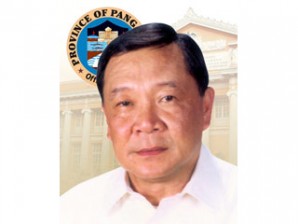DAGUPAN CITY, Philippines — Bugallon Mayor Rodrigo Orduña, the man who blew the whistle on the alleged involvement of Pangasinan Gov. Amado Espino Jr. in jueteng operations in the province, reported for work in his town on Monday, this time with security aides monitoring his movements following his exposé last week.
“Hindi pwedeng hindi ko gampanan ang katungkulan ko bilang mayor (I cannot ignore my responsibilities as mayor). There are many offers for me to stay in safe places. But I did not accept the offers and decided to return [to Bugallon] and do my work as mayor,” Orduña told the Philippine Daily Inquirer by telephone from the town hall on Monday.
The mayor said he returned home on Friday night, hours after he filed a plunder case against Espino in the Office of the Ombudsman and after appearing in a press conference at the Philippine National Police headquarters in Camp Crame with Interior Secretary Manuel Roxas II and Director General Nicanor Bartolome, PNP chief.
Espino had denied the mayor’s allegations, saying these were politically motivated. On Monday, the governor complained that the scandal had bothered his family.
“I’m sad and a little stressed, especially that my family is hurting because of what happened to me,” Espino said.
Orduña is serving his last term as mayor and is running as vice mayor in the 2013 elections.
When asked, Orduña said no death threats hounded him upon his return home. “But I anticipate that threats would soon come,” he said.
Orduña said he hoped that his family would be spared from any threat or danger arising from his expose.
“They should deal only with me. I am their enemy. They should not involve my family. I pray to God to protect my family,” he said.
For the moment, the mayor said, “everything is normal,” although he admitted he had to adjust to some changes in his life, such as living with extra security aides assigned by the PNP.
“I’m used to going around on my own. Ayaw ko sana ng may security (I considered turning down the offer for more security). But police officials told me it was necessary for me to have [security aides],” he said.
“I am able to sleep soundly at night because there are policemen guarding me. I may even gain weight,” he said.
Orduña is a new member of the Liberal Party (LP), drawing commentaries from radio commentators here who concluded that the exposé would benefit Espino’s rival in the gubernatorial race, Alaminos City Mayor Hernani Braganza of LP.
Orduña said he had no political motives when he exposed Espino’s links to jueteng operations in the province, although he admitted consulting Braganza.
“Matagal na akong ginamit ni Espino. Ayaw ko nang pagamit sa iba (I have been used for a long time by Espino. I will not allow myself to be used again). No one can dictate upon [my actions]. I had been planning to expose [jueteng in Pangasinan]. I talked with some groups, who offered support but it was only until I was able to talk with [Braganza] that I decided to finally come out,” he said.
“It is only now that there is someone I can trust. It just so happened that we belong to the same political party,” Orduña said.
If he ever got to again meet Espino personally, Orduña said: “I would tell him to stop lying.”
“He knows what I know and I know what he knows. It is expected that he would deny everything. That is just natural. I know I was involved [in jueteng] and I do not deny that I earned from [the illegal numbers game], but not as much as he earned,” he said.
Espino, a retired police and Philippine Constabulary officer, said what hurt most from Orduña’s allegations was the insinuation that he lived on jueteng money. “That’s very unfair,” he said.
Even before he assumed the post of Pangasinan police director in 1992, Espino said he had been operating a trucking and construction business.
When he left the PNP in 1998, the governor said he pursued farming and poultry raising in Bugallon town.
“I should have been given a chance to answer the accusations first before these were announced to the whole world [by Roxas]. I wasn’t treated fairly as an elected official. It was as if I was already convicted,” he said.
In 2010, Espino appeared before a Senate inquiry after retired Lingayen-Dagupan Archbishop Oscar Cruz linked him to jueteng operations in the province.
Espino said he has always been against jueteng operations.
As Pangasinan police director, Espino said he and his staff shaved their heads to protest the illegal numbers game. “For almost a year then, there was no jueteng operations in the province,” he said.
One of his officers at that time, Espino said, was incoming PNP chief, Deputy Director General Alan Purisima, then a captain and commander of a detachment in Tayug town.
“In fact, wherever I was assigned then, there was no organized jueteng, even when I was assigned as commander of the Metropolitan District Command (Metrodiscom) in Angeles City,” Espino said.
Contrary to Orduña’s statements, Espino said they were not that close.
Espino said it was Orduña’s older brother, Paterno, a retired police superintendent, who was “like a brother to me.”
He said he met Paterno when he was assigned in Camp Olivas in Pampanga and they developed a deep friendship.
“I only met Ric (Mayor Orduña’s nickname), through Pat, when I was assigned here,” Espino said.
“I won’t even recognize [Orduña’s] children if I see them because I really do not know them. He is not really that close to me as he claimed,” Espino said.
